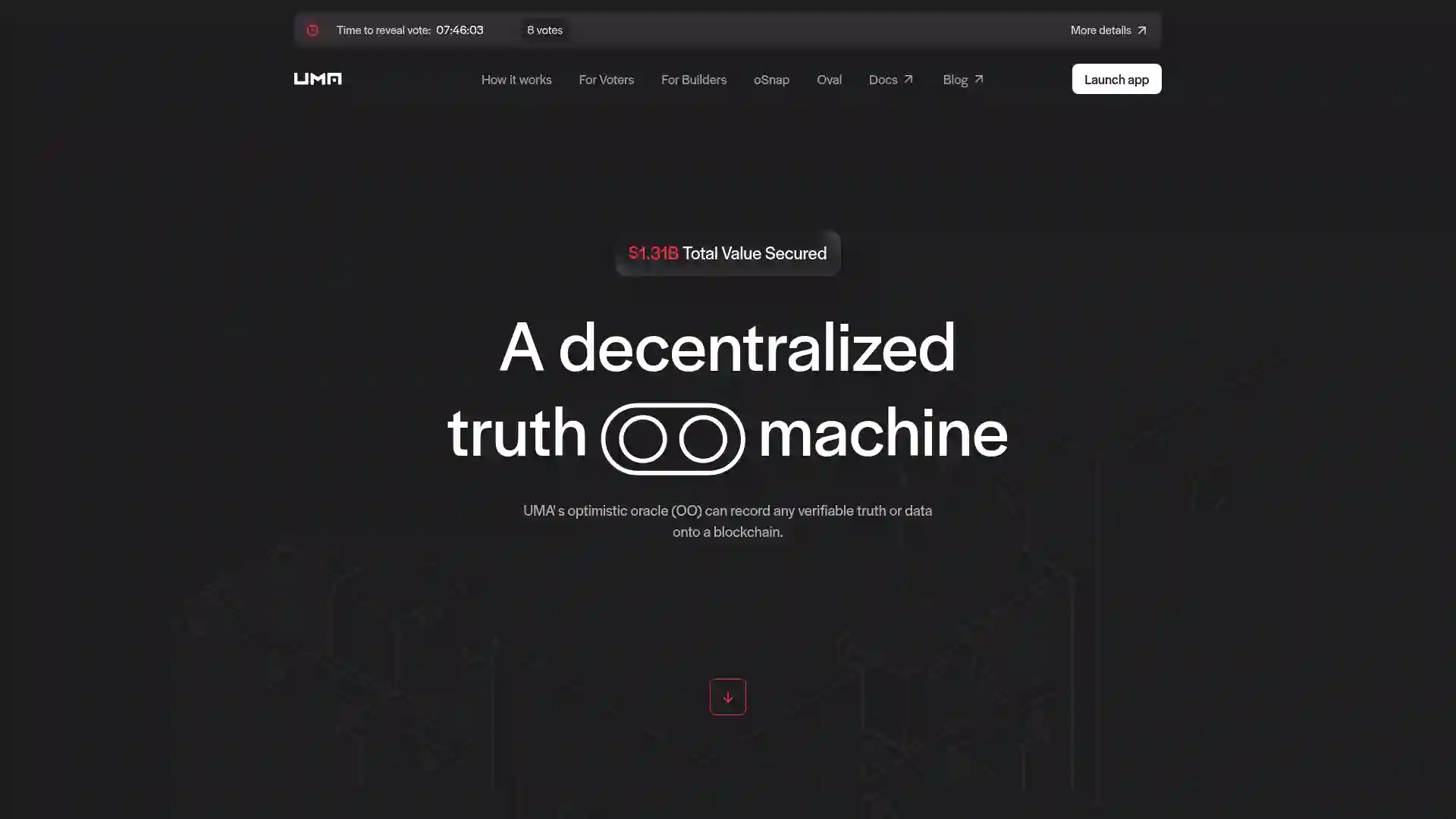UMA (UMA)
Universal Market Access (UMA) is a decentralized platform for financial contracts on the Ethereum blockchain. It is designed to allow users to create and trade synthetic assets, which derive value from underlying assets like stocks, commodities, or fiat currencies, without direct ownership. UMA offers an optimistic oracle and dispute arbitration system, enabling secure on-chain integration of diverse data types.
Overview of UMA
UMA and the Optimistic Oracle

| Ticker | UMA |
| Category | Finance / Banking |
| Website | https://uma.xyz/ |
| @UMAprotocol | |
| Contract Addresses | |
|---|---|
| ethereum | 0x04...28 Copied! Copied! |
| avalanche | 0x3b...39 Copied! Copied! |
UMA employs an Optimistic Oracle (OO) to record verifiable truths on the blockchain. The OO is adaptable and can handle ambiguity, expanding the potential for web3 applications. By incorporating human input, it processes and validates information that may not be easily defined by code. This system supports the development of financial products such as cross-chain bridges, insurance protocols, and prediction markets within the web3 ecosystem.
UMA token and governance
The UMA token serves as the governance token for the UMA Protocol. Token holders can participate in voting on UMA Improvement Proposals and price requests via a decentralized voting application. Participants in governance are rewarded for their involvement.
History of UMA
Founders and early development
UMA was co-founded by Hart Lambur and Allison Lu, both with extensive experience in finance. They met at Goldman Sachs, where Lu was a vice-president, and Lambur was a government bond trader. In 2018, they launched UMA to create universally accessible and decentralized global markets, inspired by traditional finance derivatives.
Key milestones
In December 2018, UMA released a draft of its whitepaper and launched its first mainnet product, USStocks. This ERC-20 token mirrors the performance of the top 500 US stocks, allowing cryptocurrency holders to gain exposure to the US stock market. The protocol gained popularity in 2020 with the introduction of the "priceless synthetic" token ETHBTC, designed to compare Ethereum and Bitcoin performance. UMA continues to grow, empowering users to create collateralized synthetic tokens and engage in asset trading using ERC-20 tokens.
The Optimistic Oracle
Role and function
Oracles are essential in blockchain infrastructure, enabling secure communication between off-chain data and on-chain smart contracts. UMA's Optimistic Oracle assumes that most system actors behave honestly, allowing for efficient transaction processing. Disputes are managed through a tokenholder voting mechanism, where responses to data requests are considered valid unless contested within a verification period.
Security and participation
The Optimistic Oracle involves three participants: the data-requesting contract, the data-offering participant, and a potential disputant. Disputes are resolved by UMA token holders within 48 hours, with rewards or penalties distributed based on the dispute's outcome. This process includes open voting, voting confirmation, and a rewards claim period. UMA's smart contracts are primarily for developers building decentralized applications, and all UMA token holders can participate in the oracle system.
Actors on the UMA network
Key participants
- Token sponsors: Individuals who lock collateral in a smart contract to mint synthetic tokens, ensuring over-collateralization.
- Liquidators: Monitor collateralization status and trigger liquidation if necessary, maintaining system stability.
- Disputers: Monitor smart contracts and can raise disputes if liquidation actions are incorrect.
- Data Verification Mechanism (DVM): Resolves disputes by proposing a vote to UMA token holders, determining asset prices.
- UMA token holders: Participate in the voting process, influencing dispute resolutions and earning rewards for correct votes.
Applications of UMA
Prediction markets
UMA supports smart contracts for prediction markets, allowing users to bet on various future events. These contracts enable the creation of outcome tokens based on off-chain events, with market prices determined by supply and demand.
Insurance
The Optimistic Oracle V3 facilitates insurance claims processing, verifying events and disbursing coverage to beneficiaries if claims are validated.
Data Asserter
The Data Asserter contract allows data providers to verify specific data points on the blockchain, supporting various use cases like validating validator sets or complex computations.
Covenant
Covenant is a protocol utilizing UMA's optimistic oracle for KPI-based payouts. It enhances incentive systems and governance decisions, leveraging UMA's security to define bribes based on actual results.
